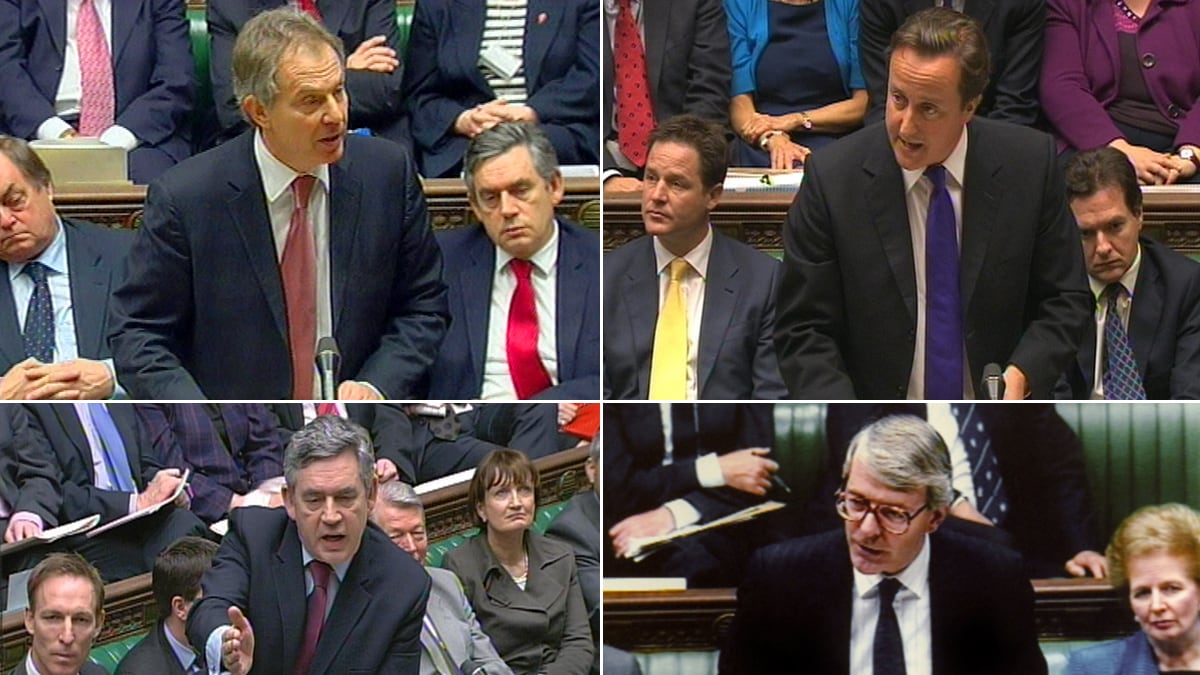Tony Blair called it “the most nerve-racking, discombobulating, nail-biting, bowel-moving, terror-inspiring, courage-draining experience” in his political life. Despite his reputation as a showman and author of bons mots, Harold Macmillan felt physically ill before each bout. And even Margaret Thatcher, who by any standard earned her nickname the Iron Lady, ate an extremely light lunch beforehand, reasoning that it couldn’t be faced “on a full stomach.”
And today it was David Cameron’s turn to step into the House of Commons, where he was grilled, prodded, incited, accused, and taunted during this week’s Prime Minister’s Questions. The Conservative leader is under intense fire for his links to Rupert Murdoch, Rebekah Brooks, and Andy Coulson, so it was a particularly brutal round—but as his predecessors’ remarks show, it’s never a walk in the park. For a half hour once a week, the head of government has to take questions directly from members of the House of Commons, many of them hostile, booby-trapped inquiries from the opposition.
For American audiences, PMQ, as it’s commonly known, is an exotic experience: at once shocking (how many recent American presidents can one imagine taking hostile questions from representatives?) and also very British, right down to the crimes of “hear, hear!” and “shame!” So it might be surprising to learn that this week marks PMQ’s 50th birthday. That mental image you have of Churchill doggedly shouting down appeasers? Didn’t happen. (In fact, Churchill was known as an excellent orator but a miserable debater, unable to react quickly despite his lengthy record of witticisms.) A regimen of two 15-minute segments on Tuesday and Thursday—which Tony Blair replaced in 1997 with one half-hour segment on Wednesday—guaranteed regular access to the prime minister and ensured that he or she came to the House of Commons regularly.

This being politics, not everybody’s pleased with the current state of affairs. For at least half of PMQ’s run, critics have derided it as a “bear pit” that functions more as an engine of partisan discord than a mechanism for governmental accountability. The critics say the introduction of television degraded it into a spectacle. “It doesn’t actually affect people much, and I don’t think people normally watch it,” says Vernon Bogdanor, a research professor at King’s College London who edited a recent book on late-20th-century prime ministers and taught David Cameron in his university days. “Most people get their views filtered through the newspapers or television.”
But it has its fans, both in Britain, where it’s fodder for highlight reels, and in the U.S., where diehard Anglophiles and eccentrics can watch it on C-Span. C-Span doesn’t track ratings numbers, but the network says anecdotal evidence shows a strong following for its airing of PMQ, which began in 1989.
So how do the prime ministers stack up? Here’s a report card of recent leaders, along with some of their greatest—and worst—moments.
1. Margaret Thatcher (1979–90)The Irony Lady remains the undisputed champ. But no one expected that before she led the Conservative Party to victory in 1979. When she was opposition leader, her PMQ sparring with Harold Wilson and James Callaghan was weak. Wilson, though not remembered as an especially strong leader, was a clever and quick-witted debater, while Callaghan was patronizing, so that Thatcher seemed “stilted, tended to hector, and was not good at catching opponents out,” says Philip Norton, professor of government at the University of Hull and a Conservative member of the House of Lords. But once she’d won, he says, “she became a colossus.” She approached PMQ as she did governance: with meticulous preparation, followed by combative and unrelenting defense of her beliefs—as seen in her well-known “No, no, no!” speech. But as Norton points out, the prime minister has a built-in advantage: He or she has the entire government at his or her hands for preparation and briefing, in addition to having already gained the approbation of voters—in contrast to an opposition leader trying to prove him- or herself.
GRADE: A+
2. John Major (1990–97)Thatcher was a hard act to follow, and John Major struggled to do so. He stuck to shorter, less stylish answers and didn’t fight as Thatcher had. But Major was also hobbled by cratering approval for the Tories, who’d been in power since 1979 and had begun to feel stale. Here he falters against a young Blair—then leader of the opposition Labour Party—late in his term.
GRADE: C
3. Tony Blair (1997–2007)He’s sometimes compared to Thatcher—a transformative leader who ended a dynasty—and Blair also shared with her a mastery of PMQ. Unlike Thatcher, he had been skilful at PMQ while opposition leader, and he carried it over into his own government. But he succeeded differently. While Thatcher set out her marker and stood by it, Blair’s debating skills aped his political style of moving to the center and forming coalitions. “Blair was much more adaptive, wily, able to sense the mood of the House and respond,” says Norton. That doesn’t mean he always dominated his opponents the way the Iron Lady did. William Hague was a rather hapless Tory leader from 1997 to 2001, facing a wildly popular Labour Party overseeing an economic boom, but Hague was a humorous and effective interrogator in PMQ. “Hague was excellent at the dispatch box [the podium used during PMQ],” Norton says. “But whatever he did, it wouldn’t have any effect.”
GRADE: A-
4. Gordon Brown (2007–10)Gordon Brown was Major to Blair’s Thatcher—but even less adept at debating. The academic Brown was widely hailed for his intellectual prowess, but he couldn’t make that work in the Commons. While few prime ministers are flatly bad, “Gordon Brown was closest to a disaster,” says Norton. “He was very wooden.” Adds Bogdanor, “He knew what he was talking about, but couldn’t convey it.” The younger, more charismatic David Cameron ran circles around him as the economy collapsed, reinforcing the idea that Brown was a clumsy, lumpish grouch.
GRADE: D
5. David Cameron (2010–present)The new prime minister has all the tools to join the upper echelon with Blair and Thatcher: debating élan, eloquence, a mind suited to a sharp jab or a complex thought as needed, and a deep understanding of how to use the media to his advantage. Even when served a plainly embarrassing and unsubstantive question, he can make the blow into a boost, as in a hilarious exchange about the rock band the Smiths in December 2010. He’s also benefited from facing off against Labour leader Ed Miliband, considered an awkward and weak speaker. But the Murdoch scandal has knocked some chinks into Cameron's armor and allowed Miliband to score some points, as seen here.
GRADE: INCOMPLETE
Of course, there’s some question of whether it matters at all. “Thatcher dominated all her opponents in question time, but that wasn’t the reason she kept winning elections—the economy was doing well, she won a war in the Falklands, the Labour Party wasn’t trusted,” Bogdanor says. Combine it with a relatively small viewership, and you’ve got an irrelevant and rather distasteful exercise, he suggests. Norton sees it as more important. “It does contribute to the stature of the prime minister,” he says. “How she performed at Prime Minister’s Questions became part of Thatcher’s persona as prime minister.”
And besides, Britons may say they hate the bear pit, but they’ve got the same weakness as Americans, Norton concludes. “It’s become more partisan, and the general view is there’s not much substance to it—but people watch it even though they don’t want to.”






